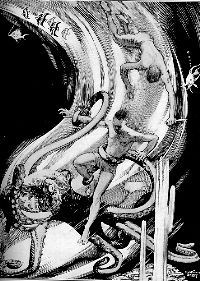We paddled out slowly toward the reef, scanning the sea-bottom through the waterglass as we went along. We halted finally in about fifty feet of water, and this time Tetua prepared for the first descent. The sun was now directly overhead and its powerful rays lighted the clear depths to an amazing distance. The great wall of the reef descended to the sea-bottom like a cliff of living coral, which, in fact, it was. Dark caverns appeared in its sides, mysterious places, full of possibilities.
The sand was light in this part of the lagoon, and through the glass I could see Tetua clearly as he moved slowly through that unreal world. I saw him tugging at a giant shell, trying to loose its firm hold. He was within fifteen feet of the great cliff of coral. Suddenly, out of a dark cavern behind him I saw a whiplash, thick as a hose, shoot out and draw itself taut about his leg. In a split-second another one, appeared and wrapt itself about his waist. I could see the look of agonized surprize on the youth's face as he perceived his enemy, whose body was hidden from me in the shadows. With a cry, I handed the glass to Vernier. The penetrating eyes of Manu, who had been following every movement of his brother, had already seen his plight. In less time than it takes to tell, he had seized the leaden weight and was over the side, descending at terrific speed in a cloud of bubbles.
"An octopus!" exclaimed Vernier, pale to the lips. "Here in Vairua they are the largest in the world. My uncle was killed by one, years ago."
 Tetua had already been
under the water a minute and a half. Vernier and I watched the grim drama going on
in the limpid depths beneath our feet. We could see Manu, knife in hand, swim to
the side of his brother. The octopus came forth from its den to face this new enemy
and fight for its life. I saw a great reddish globe of a body with a mouth that hung
before it like a parrot's beak, that worked and wobbled. Never will I forget that
horrible face! Its eyes were saucer-round, and fixt as fate. A hideous nightmare-face
to strike terror to the heart and make the blood run cold. Two grisly tentacles held
firmly to the coral at its back. Poor Tetua was trying with the desperation of life
and death to tear his body free. As Manu approached, knife in hand, a whiplash shot
out and enveloped him. I saw his lithe arm raise and strike once, twice, then a third
time with lightninglike rapidity.
Tetua had already been
under the water a minute and a half. Vernier and I watched the grim drama going on
in the limpid depths beneath our feet. We could see Manu, knife in hand, swim to
the side of his brother. The octopus came forth from its den to face this new enemy
and fight for its life. I saw a great reddish globe of a body with a mouth that hung
before it like a parrot's beak, that worked and wobbled. Never will I forget that
horrible face! Its eyes were saucer-round, and fixt as fate. A hideous nightmare-face
to strike terror to the heart and make the blood run cold. Two grisly tentacles held
firmly to the coral at its back. Poor Tetua was trying with the desperation of life
and death to tear his body free. As Manu approached, knife in hand, a whiplash shot
out and enveloped him. I saw his lithe arm raise and strike once, twice, then a third
time with lightninglike rapidity.In a second, we read, the water was clouded with an evil inky-black liquid and the actors of the grim battle were shut out from view." An exclamation burst from Vernier's lips, but --
There was nothing we could do. Thirty more seconds passed. Sickened with suspense, I hung over the side of the canoe, dreading. The men surely could live no longer without air.
"We had better try to help them," said Vernier, grimly. "Take that knife there! And that weight!"
But at that second there was a splash beside us. Manu's dripping head appeared. Blood issued from his nose and ears.
"Quick!" he gasped faintly, and we saw that he was dragging the body of Tetua.
We had them both into the canoe in a second. Tetua had ceased to breathe and lay as one dead. In the narrow confines of the canoe it was almost impossible to work up artificial respiration, but we dared not wait until we should reach shore. Vernier bent the youth over athwart and worked his arms frantically. After a few moments, the great native stirred slightly and his chest heaved. "Apae! He breathes!" exclaimed Manu. "Empty the water out of him, he has swallowed much! That devil almost got us! Four times I stabbed him, once in the eye, before I felt his hold loosen. Apaka! I will eat his heart!"
When Tetua had begun to breathe regularly again, and we knew that all danger was past, we lowered two lines with steel sharp-hooks and fished up the giant octopod from the floor of the lagoon. His huge, gelatinous body had collapsed like a balloon but his great tentacles, black and slimy in their repulsiveness, still moved spasmodically, the white vacuum cups of their under-surface sticking to whatever they touched.
Wild with rage, Manu seized his spear and drove it again and again into the body his vanquished enemy, as if he would obliterate it completely. His face, usually so frank and ingenuous, was distorted with hate, and as we paddled slowly homeward I speculated how narrow was the gulf separating the present-day "civilized" native from his head-hunting forefathers.